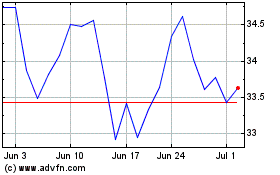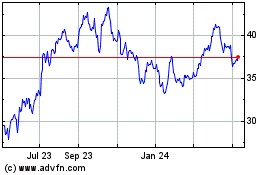Halliburton's Loss Deepens--2nd Update
May 03 2016 - 1:57PM
Dow Jones News
By Alison Sider and Anne Steele
Halliburton Co. and Baker Hughes Inc. are taking sharply
divergent paths after recently calling off a merger, once valued at
$35 billion, due to regulatory opposition.
Halliburton Chief Executive Dave Lesar said Tuesday in his first
live remarks since the failed merger was announced Sunday that his
company still wants to be a one-stop-shop for exploration and
production companies, and said it would seek other ways to grow and
increase its reach worldwide.
"If we had been successful, adding the Baker Hughes assets would
have given us that scale quickly," Mr. Lesar said in a conference
call. "But our strategy has not changed."
That was in contrast to remarks Tuesday from Baker Hughes Chief
Executive Martin Craighead, who said his company plans a more
specialized business model, pulling back from some markets and
services such as fracking in the U.S., to focus on developing and
selling new technologies.
"There are certain markets where certain product lines frankly
aren't earning their right to play," he said.
Halliburton and Baker Hughes called off their merger Sunday
after the deal encountered intense regulatory pressure on several
continents.
The second and third largest oil-field services providers had
hoped to join forces to challenge Schlumberger Ltd., their largest
rival.
Mr. Lesar said the companies knew they would face scrutiny from
regulators and believed that trying to acquire Baker Hughes was
worth the risk.
Obtaining U.S. antitrust approval for large, complex
transactions in any industry has become more difficult in recent
years, he said. And the sudden, sharp drop in oil prices made it
hard to divest businesses and eroded the potential benefit from the
deal.
"The unprecedented deterioration of the oil and gas industry
decimated the economics of the deal," Mr. Lesar said.
On Tuesday, Halliburton reported a loss of $2.41 billion, or
$2.81 a share, for the first three months of the year. The
company's quarterly loss widened from $643 million, or 76 cents a
share, a year earlier, because of drastically lower revenue from
its North American business and charges from the failed Baker
Hughes tie-up.
Excluding special items, adjusted earnings from continuing
operations were 7 cents a share. Total revenue slid 40% to $4.2
billion.
The company said it recorded Baker Hughes acquisition-related
costs of $378 million, or 44 cents a share, in the quarter.
Halliburton had previously said it recorded companywide charges
related to asset impairments and severance costs of about $2.1
billion, or $2.39 a share, in the first quarter.
Baker Hughes on Monday said it would use its $3.5 billion
break-up fee to shore up its balance sheet, buying back stock and
debt.
The company plans to scale back on hydraulic fracturing work in
the U.S., which Mr. Craighead said has become commoditized, with
customers unwilling to pay for better service or technology.
Baker Hughes also said it would step up its work selling
equipment and technology to other companies, particularly in
international markets.
"We will be more selective and creative as we look at
opportunities for our product lines globally," Mr. Craighead
said.
Though he said he didn't listen to the comments by the chief
executive of the company he had planned to combine with, now a
rival, Mr. Lesar said he believes the best way to prepare for a
rebound in oil field activity is to work in every shale formation,
offering a full suite of services.
"If you are an integrated company, you essentially can't pick
and choose where you provide, who you provide it to, where you
operate and what customers you work for," Mr. Lesar said.
Write to Anne Steele at Anne.Steele@wsj.com
(END) Dow Jones Newswires
May 03, 2016 13:42 ET (17:42 GMT)
Copyright (c) 2016 Dow Jones & Company, Inc.
Halliburton (NYSE:HAL)
Historical Stock Chart
From Mar 2024 to Apr 2024

Halliburton (NYSE:HAL)
Historical Stock Chart
From Apr 2023 to Apr 2024
